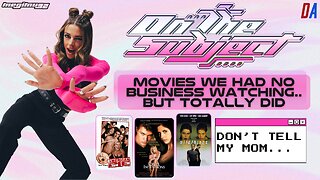Premium Only Content

Individual Rights Are Dangerous!!!
There will be a section of the audio where I try to find some information. I took too long and it's probably boring for you to wait :) If you want to skip ahead, go to 7:00.
Here's the link to the article: https://www.msn.com/en-nz/news/national/the-problem-with-the-individual-rights-argument/ar-AAQOP24
Here's the copy of the article:
The problem with the 'individual rights' argument.
Editor’s note: The opinions in this article are the author’s, as published by our content partner, and do not represent the views of MSN or Microsoft.
Hayden Thorne explores how the American right corrupted the individual freedom dialogue for its own purposes - and the danger of adopting that approach in New Zealand
In recent days, as vaccine mandates for healthcare workers and teachers have come into effect, there’s been plenty of talk about the so-called “rights” of the individual to refuse the vaccine and keep their job.
(If you want to skip ahead of my long silences, go to 7:00, haha)
Leaving to one side the public health discussion, the nature of the dialogue occurring is a major concern.
The emergence of a strong individual rights dialogue in New Zealand appears to be relatively new, and derived from American conceptions of individualism and individual freedoms.
But the way it is used in New Zealand has two problems: it corrupts the historical importance of American constitutional freedoms, and shows a serious misunderstanding of our culture and constitutional structure.
There is much we can learn from history to inform the current health crisis. Historians have made some important contributions about the history of vaccination and disease. Many of those protesting against vaccine mandates could also do with a history lesson. Invoking the holocaust, segregation, or apartheid to protest a public health measure is not only baseless, but also disrespectful and demeaning to the millions who suffered through those events.
The belief in a rigid set of rights that cannot be taken away, even when they harm or infringe on the rights of others, corrupts the way individual freedom can be (and has been) a tool for positive change.
In the spirit of learning from history, here is a lesson on how the American right corrupted the individual freedom dialogue for its own purposes, and the danger of adopting that approach in New Zealand.
Let’s start with the 1950s and 1960s. In the United States, individual rights and freedoms provided civil rights and civil liberties activists with a framework to challenge oppressive racial and social justice policies.
Famous examples such as Brown v. Board of Education in 1954, Gideon v. Wainwright in 1963 and Miranda v. Arizona in 1966 are cases where an individual right was used to push for a collective societal benefit: desegregating schools, providing lawyers to indigent defendants, and preventing oppressive police interrogations.
Groups such as the American Civil Liberties Union and National Association for the Advancement of Colored People successfully adopted an individual rights framework because they had to - the American Constitution with its supreme Bill of Rights provided the most effective mechanism to uphold the rights of coloured and marginalised Americans.
We should never lose sight of the fact these actions were undertaken for the collective good.
Importing the individualistic, American conception of rights shows a lack of understanding of how New Zealand’s constitution works.
In the 1970s, this individual rights dialogue was corrupted by the American right - in particular, the religious right - to protect what it saw as important, at the expense of other groups in society. Debates about abortion and gun control became infected with an emphasis on individual rights.
It is this post-1960s American conception of individual freedom that now seems to be dominating the anti-mandate and anti-vaccine protests. The belief in a rigid set of rights that cannot be taken away, even when they harm or infringe on the rights of others, corrupts the way individual freedom can be (and has been) a tool for positive change.
As for constitutional structures, importing the individualistic, American conception of rights shows a lack of understanding of how New Zealand’s constitution works.
America has a written Bill of Rights, enshrined in its constitution. The rights it contains are (mostly) absolutes. The US Supreme Court can, and does, invalidate legislation where it conflicts with the Bill of Rights. This system creates an incentive to frame debates in individualistic terms because the rights contained are individual in nature.
New Zealand society, reflected in our own constitutional structure, involves a much stronger view of the collective - the rights of society as a whole and the conditions that come with being a part of society.
New Zealand has a very different system. Our Bill of Rights is like any other piece of legislation. It has an important guiding and informing purpose but little more. It is neither supreme, nor entrenched.
As Professor Claudia Geiringer, chair in public law at Te Herenga Waka—Victoria University of Wellington, notes “Parliament has retained its sovereign right to legislate in conscious disregard of the Bill of Rights”.
Set against this framework, the individual rights dialogue perpetuated by anti-mandate protests is completely unhelpful. Our constitutional framework does not recognise individual rights in the same way that the American system does, and our Bill of Rights recognises that reasonable limits on individual rights are fundamental for the protection of society as a whole – a view upheld by the High Court just last month.
Let us leave behind this American-centric, rights-driven debate. It misrepresents why individual rights and freedoms are historically important and misunderstands New Zealand’s constitutional structure.
New Zealand society, reflected in our own constitutional structure, involves a much stronger view of the collective - the rights of society as a whole and the conditions that come with being a part of society.
Replacing this with a focus on individualism is selfish, does great harm to the community, and shows a lack of respect for others. Instead of focusing on the rights of the individual, the focus should be on the collective, and the things that need to be done for the good of the community.
-
 59:50
59:50
Motherland Casino
6 hours agoMel x Zofie
34.4K5 -
 44:54
44:54
Ami's House
2 days agoThe Dave Smith Debate is Broken. Here's a Better Way In | Dave's Rogan Appearance
61.7K11 -
 3:47:20
3:47:20
SlingerGames
8 hours agoDiving (get it?) Back Into Subnautica!
35.5K1 -
 58:35
58:35
BonginoReport
12 hours agoFormer Trans Athlete Accepts Biological Reality - Nightly Scroll w/Hayley Caronia (Ep.24) - 04/10/25
160K100 -
 2:48:38
2:48:38
The Sufari Hub
7 hours ago🔴NOT ENDING STREAM TILL I WIN - ROAD TO #1 GAMER ON RUMBLE - #RumbleGaming
16.3K1 -
 1:49:21
1:49:21
Joker Effect
8 hours ago250$$ Giveaway! MOTHERLAND TAKEOVER!
29.2K -
![🔴 MAFIA III [first look]](https://1a-1791.com/video/fww1/21/s8/1/V/_/U/A/V_UAy.0kob-small--MAFIA-III-first-look.jpg) 3:01:30
3:01:30
Fragniac
1 day ago🔴 MAFIA III [first look]
18K2 -
 2:06:26
2:06:26
megimu32
10 hours agoON THE SUBJECT: Movies We Had Zero Business Watching.. But Totally Did!
30.9K2 -
 2:02:59
2:02:59
Precision Rifle Network
2 days agoS4E12 Guns & Grub Live - Guns, Politics, & Training
14.5K -
![[Thursday Strike] 360 on his head | BloodStrike + Arena Breakout |](https://1a-1791.com/video/fww1/68/s8/1/N/z/6/A/Nz6Ay.0kob-small-Thursday-Strike-360-on-his-.jpg) 7:17:35
7:17:35
ItsLancOfficial
12 hours ago[Thursday Strike] 360 on his head | BloodStrike + Arena Breakout |
17.9K